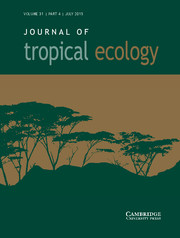Crossref Citations
This article has been cited by the following publications. This list is generated based on data provided by
Crossref.
Oostermeijer, J. G. B.
2003.
Population Viability in Plants.
Vol. 165,
Issue. ,
p.
17.
Vulinec, Kevina
Lambert, Joanna E.
and
Mellow, David J.
2006.
Primate and Dung Beetle Communities in Secondary Growth Rain Forests: Implications for Conservation of Seed Dispersal Systems.
International Journal of Primatology,
Vol. 27,
Issue. 3,
p.
855.
Oliveira, Ana Cristina M.
and
Ferrari, Stephen F.
2008.
Habitat Exploitation by Free-ranging Saguinus niger in Eastern Amazonia.
International Journal of Primatology,
Vol. 29,
Issue. 6,
p.
1499.
Lapenta, Marina Janzantti
and
Procópio-de-Oliveira, Paula
2008.
Some Aspects of Seed Dispersal Effectiveness of Golden Lion Tamarins (Leontopithecus Rosalia) in a Brazilian Atlantic Forest.
Tropical Conservation Science,
Vol. 1,
Issue. 2,
p.
122.
Lapenta, MJ.
Procópio-de-Oliveira, P.
Kierulff, MCM.
and
Motta-Junior, JC.
2008.
Frugivory and seed dispersal of golden lion tamarin (Leontopithecus rosalia (Linnaeus, 1766)) in a forest fragment in the Atlantic Forest, Brazil.
Brazilian Journal of Biology,
Vol. 68,
Issue. 2,
p.
241.
Culot, Laurence
Huynen, Marie-Claude
Gérard, Paul
and
Heymann, Eckhard W.
2009.
Short-term post-dispersal fate of seeds defecated by two small primate species (Saguinus mystaxandSaguinus fuscicollis) in the Amazonian forest of Peru.
Journal of Tropical Ecology,
Vol. 25,
Issue. 3,
p.
229.
Porter, Leila M.
and
Garber, Paul A.
2010.
Mycophagy and its influence on habitat use and ranging patterns in Callimico goeldii.
American Journal of Physical Anthropology,
Vol. 142,
Issue. 3,
p.
468.
Smith, Andrew C.
2010.
The Evolution of Exudativory in Primates.
p.
109.
Boyle, Sarah A.
and
Smith, Andrew T.
2010.
Can landscape and species characteristics predict primate presence in forest fragments in the Brazilian Amazon?.
Biological Conservation,
Vol. 143,
Issue. 5,
p.
1134.
Culot, Laurence
Muñoz Lazo, Fernando Julio João
Huynen, Marie-Claude
Poncin, Pascal
and
Heymann, Eckhard W.
2010.
Seasonal Variation in Seed Dispersal by Tamarins Alters Seed Rain in a Secondary Rain Forest.
International Journal of Primatology,
Vol. 31,
Issue. 4,
p.
553.
Smith, Andrew C.
2010.
The Evolution of Exudativory in Primates.
p.
45.
Cardoso, Nayara A.
Le Pendu, Yvonnick
Lapenta, Marina J.
and
Raboy, Becky E.
2011.
Frugivory patterns and seed dispersal by golden-headed lion tamarins (Leontopithecus chrysomelas) in Una Biological Reserve, Bahia, Brazil.
mammalia,
Vol. 75,
Issue. 4,
Sansevero, Jerônimo Boelsums Barreto
Prieto, Pablo Viany
de Moraes, Luiz Fernando Duarte
and
Rodrigues, Pablo JoséFrancisco Pena
2011.
Natural Regeneration in Plantations of Native Trees in Lowland Brazilian Atlantic Forest: Community Structure, Diversity, and Dispersal Syndromes.
Restoration Ecology,
Vol. 19,
Issue. 3,
p.
379.
Muñoz Lazo, Fernando Julio João
Culot, Laurence
Huynen, Marie-Claude
and
Heymann, Eckhard W.
2011.
Effect of Resting Patterns of Tamarins (Saguinus fuscicollis and Saguinus mystax) on the Spatial Distribution of Seeds and Seedling Recruitment.
International Journal of Primatology,
Vol. 32,
Issue. 1,
p.
223.
Heymann, Eckhard W.
Lüttmann, Kathrin
Michalczyk, Inga M.
Saboya, Pedro Pablo Pinedo
Ziegenhagen, Birgit
Bialozyt, Ronald
and
Smith, M. Alex
2012.
DNA Fingerprinting Validates Seed Dispersal Curves from Observational Studies in the Neotropical Legume Parkia.
PLoS ONE,
Vol. 7,
Issue. 4,
p.
e35480.
Kimuyu, Duncan M.
Wahungu, Geoffrey M.
and
Otieno, Dennis O.
2012.
Seed dispersal by Tana River mangabeys in fragmented gallery forests.
Open Journal of Ecology,
Vol. 02,
Issue. 01,
p.
12.
Caves, Eleanor M.
Jennings, Summer B.
HilleRisLambers, Janneke
Tewksbury, Joshua J.
Rogers, Haldre S.
and
Farwig, Nina
2013.
Natural Experiment Demonstrates That Bird Loss Leads to Cessation of Dispersal of Native Seeds from Intact to Degraded Forests.
PLoS ONE,
Vol. 8,
Issue. 5,
p.
e65618.
Smith, Joanna M.
and
Smith, Andrew C.
2013.
An investigation of ecological correlates with hand and foot morphology in callitrichid primates.
American Journal of Physical Anthropology,
Vol. 152,
Issue. 4,
p.
447.
SATO, Hiroki
2014.
The Roles of Primates as Seed Dispersers:.
Primate Research,
Vol. 30,
Issue. 1,
p.
53.
Lenz, Bryan B.
Jack, Katharine M.
and
Spironello, Wilson R.
2014.
Edge effects in the primate community of the biological dynamics of forest fragments project, Amazonas, Brazil.
American Journal of Physical Anthropology,
Vol. 155,
Issue. 3,
p.
436.




